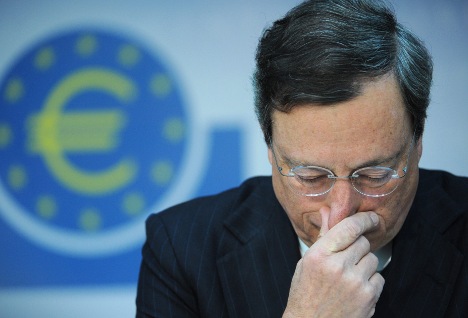Draghi said the ECB would gear up to buy Italian and Spanish bonds on the open market – but would only act after eurozone governments activate bailout funds to do the same.
So far Germany has remained mum on Draghi’s “possible bond-buying” statement – an option it has vehemently objected to in the past.
Draghi said all 23 members of the Governing Council endorsed Thursday’s statement with one exception – a reference to Bundesbank president Jens Weidmann.
“It’s clear and it’s known that (Germany’s) Bundesbank have their reservations about the programme of buying bonds. The idea is we now have the guidance, the monetary policy committee, the risk committee and the markets committee will work on this guidance and then (we) will take a final decision and the votes will be counted.”
Draghi’s wording implied he may be prepared to outvote the Germany if necessary.
The markets were unimpressed by Draghi’s announcement, having anticipated a more concrete measure. He had raised expectations to fever pitch with a vow last week to do “whatever it takes” to preserve the embattled single currency.
In addition to his promise to intervene possibly on the bond markets, Draghi stepped up his verbal rhetoric, warning traders that speculating against the euro was a lost cause.
Reiterating that the euro was “irreversible”, he said: “It’s pointless to bet against the euro.”
But he failed to back up his talk with action, analysts complained.
“The ECB did not change its monetary policy nor did it provide us with details about possible future actions,” complained Alexandra Estiot, analyst at BNP Paribas.
“Stress on sovereign debt markets has to be addressed and the ECB could help. But once more, the ECB threw the ball back in the politicians’ court,” she said.
The euro fell to $1.22, after briefly topping $1.24, its highest rate since June 5.
Earlier in the day, the ECB said it would keep interest rates unchanged at 0.75 percent.
The Local/afp/sh



 Please whitelist us to continue reading.
Please whitelist us to continue reading.
Member comments